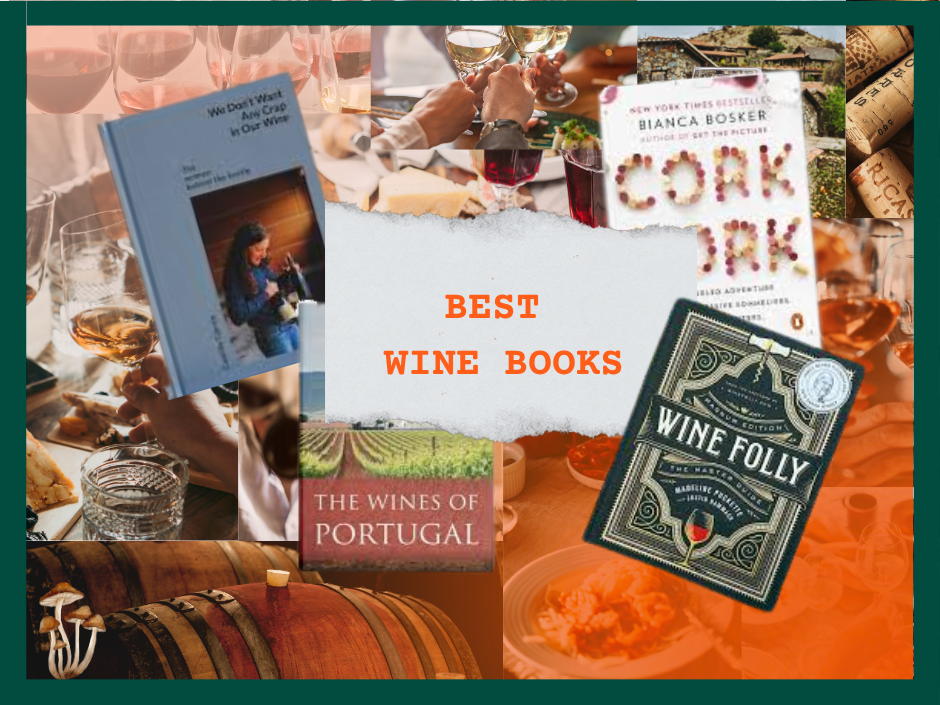The Best Wine Books to Expand Your Palate and Perspective
- David Ilsner
- Aug 1, 2025
- 4 min read
Whether you're a curious beginner or a seasoned sipper, there’s a wine book that can uncork something new for you. From visual guides and historical recounts to industry exposés and regional discoveries, these books reflect the diverse, complicated, and delicious world of wine.

‘Wine Folly: The Master Guide’ by Madeline Puckette and Justin Hammack
Wine Folly is an educational platform designed to make wine knowledge more accessible through engaging visuals and clear explanations. Created by sommelier Madeline Puckette, the project has become one of the most popular resources for wine beginners, offering a welcoming and visually compelling introduction to the world of wine.
The book, “Wine Folly: The Master Guide,” serves as both an entry point for new enthusiasts and a valuable reference for more experienced wine drinkers. It organizes complex information into practical, easy-to-understand charts, maps, and grape profiles, making it simple to navigate topics such as varietals, wine styles, and regional characteristics.
For those just beginning their wine journey, this book provides essential foundational knowledge. For professionals or collectors, it functions as a quick-reference tool with concise, well-structured insights. Its clarity, accuracy, and design-forward approach make it one of the most versatile wine books available.
‘We Don’t Want Any Crap in Our Wine’ by Camilla Gjerde
This book offers a rare and important perspective within the natural wine movement, spotlighting nine women who are reshaping the way wine is made and understood. Written by Camilla Gjerde, “We Don’t Want Any Crap in Our Wine” shares the stories of female winemakers, exploring their philosophies, challenges, and the deeply personal reasons behind their commitment to natural practices.
What makes this book unique is its focus on voices that are often overlooked in traditional wine literature. Rather than centering on technical processes or ratings, it celebrates identity, intuition, and individualism. Each profile is equally intimate as it is informative. Readers curious about natural wine will find this a thoughtful and human-centered introduction to the people who are helping to define it.
‘The World Atlas of Wine’ by Hugh Johnson and Jancis Robinson
This book is a pillar of wine education. “The World Atlas of Wine” is as much a reference as it is an experience. First published in 1971 and updated regularly, it charts the world's wine regions with detailed maps and encyclopedic entries. The latest editions reflect a more global perspective, with significant additions for Asia, South America, and beyond.
This is not casual beach reading. Instead, it is a serious, information-rich book best used at a table with a glass in hand. Still, it's indispensable for geography lovers and anyone trying to understand why wines taste the way they do based on climate, elevation, and soil. If Wine Folly is the illustrated intro, this is the in-depth textbook.
‘Adventures on the Wine Route: A Wine Buyer’s Tour of France’ by Kermit Lynch
Part travelogue, part wine manifesto, “Adventures on the Wine Route: A Wine Buyer’s Tour of France” recounts Kermit Lynch's journeys through the French countryside in search of soulful, uncompromised wines. Originally published in the 1980s but still deeply relevant, the book champions small producers and traditional methods, and helped ignite the American love affair with “real” wine.
‘The Wines of Portugal’ by Richard Mayson
Portugal has long been a sleeper hit in the wine world, and Richard Mayson’s comprehensive guide is a deep dive into its complexity. He covers not only the famous fortified wines of the Douro, but also the many still wine regions now gaining international acclaim, from Dão to Bairrada to Alentejo. It also provides in depth coverage of the history of the country and how it impacted the wine industry throughout the years and turned it into what it is today.
This book is for those wanting to explore beyond France and Italy. Mayson brings academic rigor to the subject, but also writes with affection and clarity. You'll come away with a better understanding of the unique grape varieties (like Touriga Nacional and Baga), the dramatic landscapes, and the revival of traditional methods. Ideal for the traveler, scholar, or value wine hunter.
‘Cork Dork’ by Bianca Bosker
“Cork Dork” is a fast-paced, narrative nonfiction book that follows journalist Bianca Bosker as she immerses herself in the world of professional wine tasting. With no prior experience, she trains her palate alongside sommeliers, attends secret tasting groups, and explores the sensory science behind how we experience flavor. The book offers an entertaining, behind-the-scenes look at wine culture, combining investigative reporting with personal discovery. It is particularly engaging for readers interested in the obsessive side of wine and how expertise is built.
‘Wine and War: The French, the Nazis, and the Battle for France’s Greatest Treasure’ by Don and Petie Kladstrup
“Wine and War” tells the remarkable true story of how French winemakers protected their vineyards, cellars, and heritage during the Nazi occupation of World War II. Drawing on interviews, archival research, and personal accounts, Don and Petie Kladstrup document the ingenuity and quiet resistance of vintners who risked everything to safeguard their wines from confiscation and destruction. The book weaves together history, politics, and viticulture in a way that feels both educational and deeply human.
Wine Books to Read Between the Vines
There are far too many wine books to narrow down to just one definitive list, but these few offer a meaningful cross-section of what wine writing can be. From visual guides and historical accounts to personal narratives and philosophical reflections, each book brings something unique to the table. Whether you are looking to build foundational knowledge, explore lesser-known regions and grapes, or better understand the people and politics behind the wine industry, these titles provide a strong starting point.



Comments